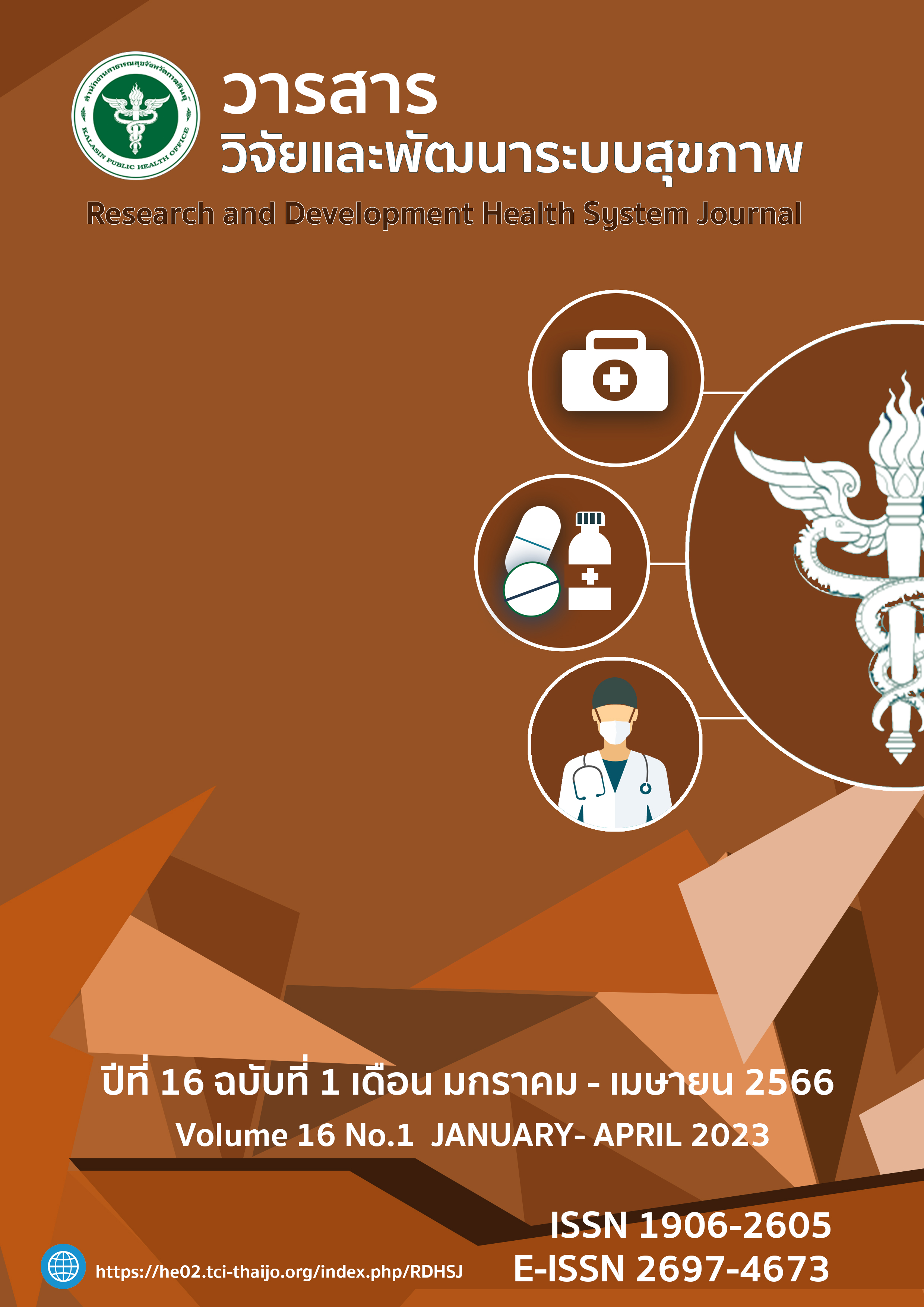ประสบการณ์ในการควบคุมโรคได้สำเร็จของผู้ป่วยหืด ในชุมชนจังหวัดสุราษฎร์ธานี
คำสำคัญ:
ประสบการณ์, หอบหืด, การควบคุมโรคบทคัดย่อ
โรคหืดเป็นโรคเรื้อรังที่ควบคุมได้ยากและคุกคามชีวิต ความรอบรู้ด้านสุขภาพเป็นปัจจัยสำคัญในการควบคุมโรค แต่ยังไม่มีการศึกษาความรอบรู้ที่ควบคุมโรคหืดได้สำเร็จของผู้ป่วย
การศึกษานี้เป็นการศึกษาเชิงคุณภาพในชุมชนของจังหวัดสุราษฎร์ธานีซึ่งมีผู้ป่วยโรคหืดจำนวนมาก และพบอัตราเสียชีวิตสูง มีวัตถุประสงค์เพื่อศึกษาประสบการณ์การควบคุมโรคได้สำเร็จ ของผู้ป่วยโรคหืด จำนวน 9 ราย ภายใต้ปรัชญาปรากฏการณ์วิทยาแบบตีความของไฮเดกเกอร์ โดยใช้กรอบแนวคิดความรอบรู้ทางสุขภาพของนัทบีมในการสร้างข้อสัมภาษณ์เชิงลึก วิเคราะห์ข้อมูลตามแนวทางของไดเคลแมนและอัลเลน
ผลการศึกษา พบว่า ความรอบรู้สุขภาพขั้นพื้นฐาน ขั้นปฏิสัมพันธ์ และขั้นวิจารณญาณเป็นปัจจัยสำคัญในการสนับสนุนให้สามารถควบคุมโรคหืดได้สำเร็จ
การศึกษาในอนาคต ควรพัฒนากิจกรรมแทรกแซง (intervention) ความรอบรู้สุขภาพโรคหืดขั้นพื้นฐาน ขั้นปฏิสัมพันธ์ และขั้นวิจารณญาณ เพื่อการควบคุมโรคหืดในชุมชน และควรขยายการศึกษาไปยังพื้นที่อื่นๆ โดยการศึกษาผสานวิธีทั้งเชิงปริมาณและเชิงคุณภาพ เพื่อให้ได้องค์ประกอบของปัจจัยในการควบคุมโรคหืดได้สำเร็จที่ชัดเจนขึ้น ทั้งควรมีการพัฒนาเครื่องมือวัดความรอบรู้ในการควบคุมโรคหืด เพื่อใช้วัดผลก่อนและหลังการแทรกแซงกิจกรรมเพิ่มความรอบรู้ในการควบคุมโรคหืดของผู้ป่วย
Downloads
เอกสารอ้างอิง
Abter AJ et al. Linking numeracy and asthma-related quality of life. Patient Educatio Counseling 2009; 75(3): 86-91.
Abter AJ et al. Association of health literacy and adherence outcome of moderate to severe Asthma. Journal allergy clinical immunological 2011; 128(3): 516-523.
Abter AJ et al. The association of health literacy with adherence and outcomes in moderate-severe asthma. Journal of allergy clinical immunological 2013; vol.132(2): 321-327.
Adams RJ et al. Inadequate health literacy is associated with increased asthma morbidity in a Population sample. Journal of allergy clinical immunological 2009; 124: 601-603.
Boonpiyathad T, Yimsawad S, and Sangasapaviriya A. The study of the cost of treatment for asthma in Phramongkutklao Hospital: Study of Population in Adults,” Medical archives The Medical Association of Thailand under the Royal Patronage 2016; 99(1): 51-57.
Denzin NK and Lincoln YS (Eds.). The landscape of qualitative research. 3rd ed, Sage Publications. 2008.
Department of Health Thailand, “Thais know health Moving towards Thailand 4.0: Health literate Citizen Towards Thailand 4.0,” in 10th National Congress on Health and Environmental Health Promotion; 2017.
Dewalt A et al. Low parental literacy is as-sociated with worse asthma care measures in children. Ambulation pediatric 2007; 7: 25-31.
Diekelmann N. & Allen D. A Hermeneutic Analysis of the NLN’s Criteria for the Appraisal of the baccalaureate Programs. National League for Nursing, New York. 1989.
Edwards M et al. The development of health literacy in patients with a long-term health condition: the health literacy pathway model. BMC Public Health 2012; 12: 1471-2458.
GBD 2019 Diseases and Injuries Collaborators, Global burden of 369 diseases in 204 countries and territories, 1990-2019: a systematic analysis for a Global burden of diseases study 2019. Lancet, 2020; 396(10258): 1204-1222.
Global Initiative for Asthma (GINA), Pocket guide for asthma management and prevention [Online]. 2021 [cited 2021 Jan 30]. Available from: https://ginasthma.org/
London AMM. and Schulz P. Influences of health literacy, judgment skills, and empowerment on Asthma self-management practices. Patient Education and Counseling 2015; 98: 908-917.
Mancuso CA and Rincon M. Impact of health literacy on longitudinal asthma outcomes. Journal of General Intern Med 2006; 21: 813-817.
Nutbeam D. The evolving concept of health literacy. Social Science & Medicine 2008; 67(12) : 2072-2078.
Nutbeam D. Defining and measuring Health literacy: what can we learn from literacy studies? Int. J. Public Health 2009; 54:303-5.
Paasche-Orlow MK et al. Education may reduce health literacy disparities in asthma self-Management. American Journal of Respiration Critical Care Medicine 2005; 172: 980-986.
Poachanukoon O. Epidemiology of allergies in Allergy and primary immunodeficiency in children. Bangkok: Siam Color Print 2012; 15-22.
Peteze LA. Health care navigation tool assesses asthma self-management and health literacy. Journal Of allergy clinical immunological 2016; 138(6): 1593-1599.
Rosas-Salaza C et al. Health literacy and asthma. Journal of allergy clinical Immunological 2012; 129(4): 935-942.
Rosenfield L et al. Beyond reading alone: the relationship between aural literacy and asthma Management. Patient Education Counseling 2011; 82: 110-116.
Shone LP et al. The role of parent health literacy among urban children with persistent asthma. Patient Education Counseling 2009; 75: 368-375.
Surat Thani Provincial Health Office. Causes of Morbidity Report Surat Thani Province; 2017: Available from http://www.srpho.go.th. 2017.
Thai Asthma Council. Guidelines for the diagnosis and treatment of asthma in Thailand for adults 2022, Beyond Enterprise: Bangkok 2022.
Williams MV et al. Inadequate literacy is a barrier to asthma knowledge and self-care. Chest 2008; 114 : 1008-1015.
Wood MR et al. African American parents’/guardians’ health literacy and self-efficacy and their child’s level of asthma control. Journal of Pediatric Nursing 2010; 25: 418-427.
World Health Organization, Asthma key facts 2017, Available from https://www.who.int/newsroom/q-a-detail/chronic-respiratory-diseases-asthma, May. 15, 2020.
World Health Organization, Asthma [Online]. 2021 [cited 2021 Jan 10]. Available from: https://www.who.int/news-room/fact-sheets/detail/asthma.
ดาวน์โหลด
เผยแพร่แล้ว
รูปแบบการอ้างอิง
ฉบับ
ประเภทบทความ
สัญญาอนุญาต
ลิขสิทธิ์ (c) 2023 วารสารวิจัยและพัฒนาระบบสุขภาพ

อนุญาตภายใต้เงื่อนไข Creative Commons Attribution-NonCommercial-NoDerivatives 4.0 International License.
เนื้อหาและข้อมูลในบทความที่ลงตีพิมพ์ในวารสารศูนย์ดัชนีการอ้างอิงวารสารไทย ถือเป็นข้อคิดเห็นและความรับผิดชอบของผู้เขียนบทความโดยตรงซึ่งกองบรรณาธิการวารสาร ไม่จำเป็นต้องเห็นด้วย หรือร่วมรับผิดชอบใด ๆบทความ ข้อมูล เนื้อหา รูปภาพ ฯลฯ ที่ได้รับการตีพิมพ์ในวารสารศูนย์ดัชนีการอ้างอิงวารสารไทย ถือเป็นลิขสิทธิ์ของวารสารศูนย์ดัชนีการอ้างอิงวารสารไทย หากบุคคลหรือหน่วยงานใดต้องการนำทั้งหมดหรือส่วนหนึ่งส่วนใดไปเผยแพร่ต่อหรือเพื่อกระทำการใด จะต้องได้รับอนุญาตเป็นลายลักณอักษรจากวารสารศูนย์ดัชนีการอ้างอิงวารสารไทยก่อนเท่านั้น







